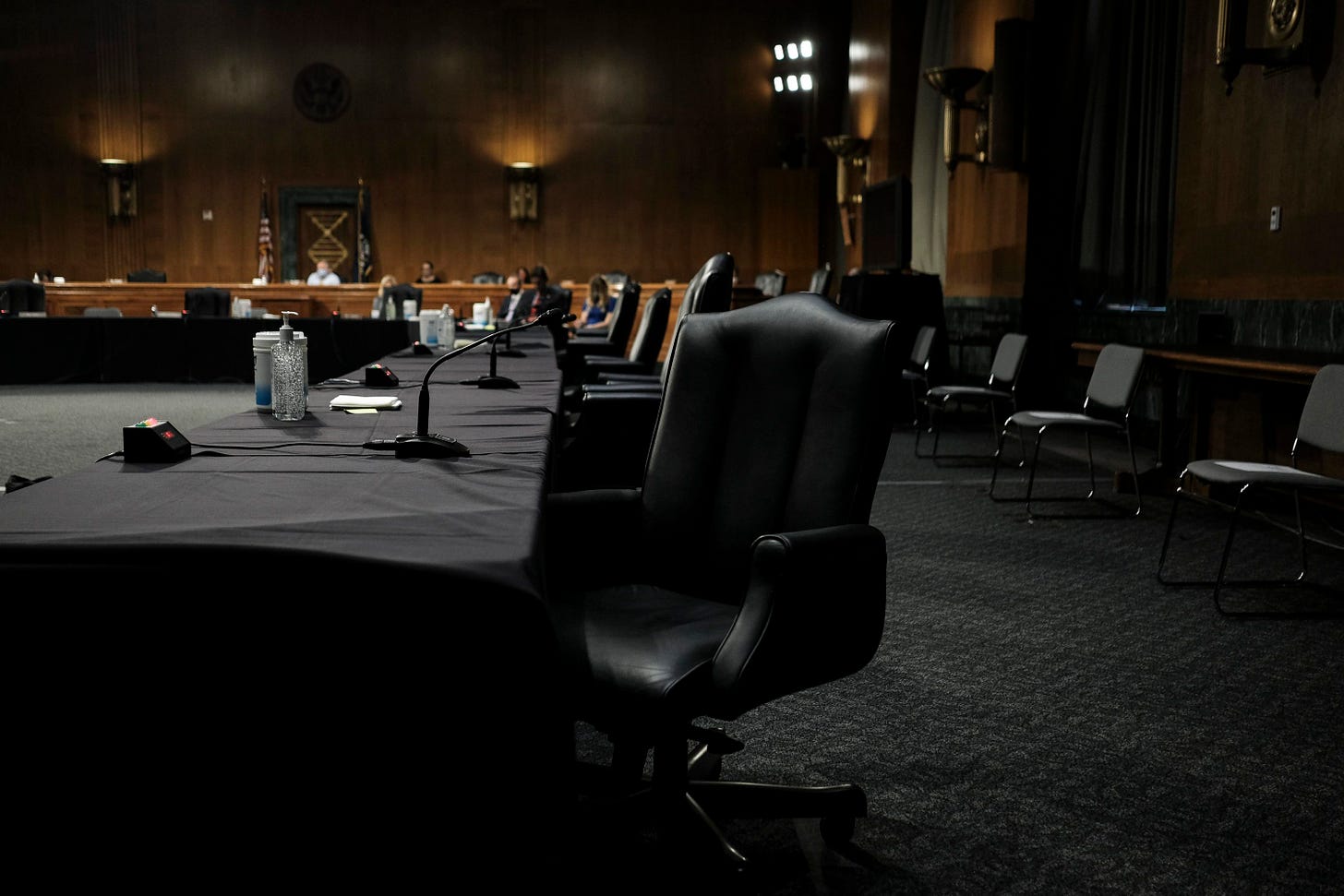Congress AWOL on National Security
Senators and representatives from both parties are failing to push back against Trump decisions they know are wrong.

Let’s get this out of the way: Donald Trump is a threat to U.S. national security. He tramples alliances, pals around with dictators, exploits official U.S. relations with other countries as a tool for personal gain, and is remarkably stupid and dishonest.
But Congress, through its inaction, is also a threat to national security.
On matters of foreign policy and national security, the Constitution divides control between the two political branches. The president can make treaties, but they can only be ratified by a Senate supermajority. The president is the commander-in-chief of the military, but Congress controls the purse strings. The president can raise or lower tariffs and can restrict imports, but only because he has been granted those powers by Congress, which can revoke them. By populating the Departments of State and Defense and other agencies with political appointees, the president controls the broad direction of U.S. foreign affairs, but Congress must first confirm those appointees. The president formulates policy and strategy, but Congress wields considerable influence by controlling the allocation of funds.
In the course of exercising its powers, Congress has, since the founding, conducted various forms of oversight of the executive branch: investigations, hearings, line-by-line budget reviews, decisions about the structure of executive branch departments. Using these and other tools, Congress not only checks and balances the actions of a given administration but holds accountable the executive branch across administrations.
For the last several years, however, Congress has failed to conduct oversight in a responsible way. This is part of a broader trend of congressional dereliction of duties, but the problem has become distinctively worse since President Trump came to office.
Congressional Democrats and Republicans alike have been dissatisfied with President Trump’s actions on national security issues—from pardons of war criminals to troubling appointments to the Syria pullout to the reduction of U.S. forces in Germany. But neither Democrats nor Republicans have done much of anything about it.
In the case of Republicans, their cowardly tactic has been “We don’t like it, Mr. President, but we will let you do it as long as you don’t make us publicly take a side.”
As for the Democrats, with the important exception of the impeachment over the Ukraine scandal, they are forceful in rhetoric but weak in practice. They go on talk shows and give interviews and make statements and write strongly worded letters to condemn the president’s actions, but use no other tool they possess. “We will just have to defeat him in 2020,” the Democrats say to themselves.
Because of this dynamic among the two parties, every time Trump has overreached his powers on national security matters during the last three and a half years, Congress has let him get away with it.
The most recent example is the appointment of Anthony Tata to an important policy position in the Pentagon. After the president nominated Tata to be the under secretary of defense for policy (USD(P)), news stories came to light making clear how deeply unsuited he is for the position. But the Republican-controlled Senate, instead of rejecting his nomination, decided not to hold a hearing. And the president named him to the position immediately underneath the USD(P)—sidestepping the required Senate confirmation process by appointing him only in a “temporary” capacity. So Tata is now the acting principal deputy USD(P). And he will be reporting to an acting USD(P). Both Republicans and Democrats dislike Tata, but they haven’t sought aggressively to stop his ascent.
Donald Trump is a very unpopular president. He always has been. Democrats, though, had a landslide in the 2018 midterms, taking control of the House. Why not use the power of the purse strings to influence the president’s reckless national security policy? Congressional Democrats could go out and explain to the American people that it is Donald Trump who is forcing them to take such actions.
They could subpoena civilian officials—and maybe even senior military officers—from the Department of Defense to testify under oath on their views on Tata’s qualifications.
They could—and should—do the same with other controversial Trump actions. Do you not like the reduction of forces in Germany? Well, relocation of those forces requires money. How about you not fund it? How about Congress doesn’t pass a National Defense Authorization Act until Trump restores the troops to Germany? Are members of Congress scared about the bad coverage they would get for not paying the troops’ salaries? Okay. Pass a bill that only compensates the troops but funds nothing else. Let Trump veto compensation for the troops. How about a veto-proof majority vote to restore the number of troops in Germany by law? Even if it doesn’t pass, it will put Republicans on the record on the wrong side of a policy. How about subpoenaing Secretary of Defense Mark Esper, the acting Assistant Secretary for International Security Michael C. Ryan, Chairman of the Joint Chiefs of Staff Gen. Mark Milley, U.S. European Command Commander Gen. Tod Wolters, and U.S. Army Europe Commander Lt. General Christopher Cavoli to publicly express their opinions about the Trump decision on Germany?
Members of Congress won’t do any of this, however, because they are cowardly and lazy. Such actions require risk, moral courage, and effort—not to mention a basic interest in actually governing. Unfortunately, all of these qualities are in short supply.
The Constitution does not leave Congress powerless in foreign policy. Congress has simply decided to disarm itself.

